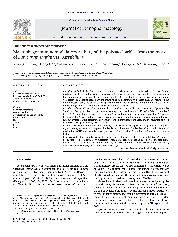摘要
Aim of the study: Radix Bupleuri, one of the most frequently prescribed crude herbs in traditional Chinese medicine, has been used for centuries to treat inflammatory diseases. However, little is known about the therapeutic mechanisms of crude polysaccharides (BPs) isolated from the roots of Bupleurum smithii var. parvifolium. Macrophages play important roles in inflammatory diseases such as systemic lupus erythematosus (SLE). The purpose of the present work was to investigate immunomodulative effects of Bupleurum polysaccharides on murine peritoneal macrophages.
Materials and methods: BALB/c mice were administered intragastrically with Bupleurum polysaccharides 20, 40, and 80 mg kg(-1) day(-1), or prednisone 3 mg kg(-1) day(-1) or levamisole 25 mg kg(-1) day(-1) from day 0 to day 6. Peritoneal macrophages were isolated 5 days after intraperitoneal injection of 1 mL 5% sodium thioglycollate. Phagocytic functions of macrophages were studied; cytokines concentrations in the culture supernatants were determined by enzyme-linked immunosorbent assay and the secretion of nitric oxide (NO) was quantified by Griess reaction.
Results: Treatment with BPs enhanced phagocytic functions of macrophages (phagocytosis of apoptotic thymocytes, IgG-opsonized sheep red blood cells and chicken red blood cells) and inhibited LPS-induced productions of NO and proinflammatory cytokines (interleukin-1 beta, interleukin-6 and tumor necrosis factor-alpha).
Conclusions: Bupleurum polysaccharides up-regulated phagocytic activities but inhibited LPS-induced productions of proinflammatory mediators. These data suggested that at least part of the traditional beneficial effects of Bupleurum on inflammatory diseases could be ascribed to the immunomodulatory effects of Bupleurum polysaccharides on macrophages.
- 出版日期2010-7-20
- 单位复旦大学
